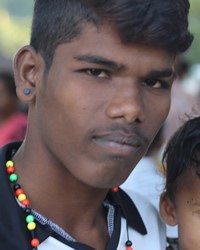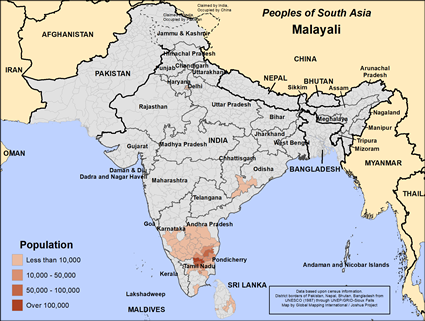Malayali in India

Photo Source:
Anonymous
|

Map Source:
People Group data: Omid. Map geography: UNESCO / GMI. Map Design: Joshua Project.
|
| People Name: | Malayali |
| Country: | India |
| 10/40 Window: | Yes |
| Population: | 376,000 |
| World Population: | 2,118,800 |
| Primary Language: | Tamil |
| Primary Religion: | Hinduism |
| Christian Adherents: | 0.11 % |
| Evangelicals: | 0.00 % |
| Scripture: | Complete Bible |
| Ministry Resources: | Yes |
| Jesus Film: | Yes |
| Audio Recordings: | Yes |
| People Cluster: | South Asia Tribal - other |
| Affinity Bloc: | South Asian Peoples |
| Progress Level: |
|
Introduction / History
Two distinct groups of people from one geographically small area both claim the name Malayali. One group is from the southern Indian state of Kerala, and that is also the name of the local language. The second group, and the one that this profile focuses on, is found primarily in the Indian state of Tamil Nadu, with smaller populations in the states of Karnataka, Pondicherry, Delhi, Odisha, and Andhra Pradesh. These two groups, while fairly close to one another in terms of geographic distance, are separated by the southern end of the Western Ghats mountain range. While the Malayalis are a tribal people, they have only inhabited the southern tip of India for about 10 generations. The ancestors of the Malayali slowly immigrated from the Middle East and through South Asia, combining with other peoples along the way, to eventually end up in their current location. It is Malayali tradition that three brothers each settled on separate nearby hills to form the three oldest Malayali villages. According to legend, in the late first century, the Apostle Thomas evangelized and performed miracles throughout southern India, specifically in Kerala and Tamil Nadu. In later years nearly all of the peoples of southern India were introduced to seafaring traders from other locations such as China, South East Asia, Eastern Africa, and Europe. Some of these Europeans, such as the Dutch, enslaved groups like the Malayali as a major source of slaves for their plantations.
What Are Their Lives Like?
The Malayali are still primarily a tribal people. Most of them live in a rural setting with an economic emphasis on farming, herding, and gathering non-timber products from the forests around them. Some of their most common crops include rice, millet, and a variety of spices. Many Malayali people live in mud huts or small houses with thatched roofs. Most Malayalis speak Tamil, the primary language of Tamil Nadu and the oldest of the four Dravidian languages that descended from Sanskrit. In 1961, only 2% of the Malayali population could read and write, and that number remains low today. Traditional ways of doing things are very important to the Malayalis. For the process of engagement and marriage, for example, they have elaborate rituals involving almost all of the family, multiple ceremonial visitations, traditional scripts to be recited, and a bridal price to be paid. A social hierarchy rules parts of Malayali life. There is a Govendan, who is the leader of the highest tier, the Mooppan, who is the intermediary between the Govendan and the common people, and then the common people on the lowest tier. Also, elders are generally highly respected. Family is important to the Malayalis, and they are not afraid of going out of their ways or being inconvenienced for the sake of family. The average Malayali of Tamil Nadu does not make much money, but they are content with what they have. More recently, scientists have been working with the Malayali to study the non-timber forest products that they use for traditional medicine. They are adaptable and are able to meet the challenges that a modern world brings.
What Are Their Beliefs?
Almost all Malayali practice Hinduism, the ancient religion of India. Their brand of Hinduism is influenced by animism. The Malayali worship and serve the gods of the Hindu pantheon. Hindus believe that by performing rituals and good works that they will attain "moksha" or freedom from the endless cycle of birth, death and rebirth. The Malayali visit Hindu shrines and offer prayers, food, flowers, and incense to their gods in hopes of gaining protection and benefits. They do not have a personal or familial relationship with their gods as Christians do. There are many forms of Hinduism, each with its own deities and beliefs. The main yearly holidays of the Malayali people are Holi, the festival of colors and the start of spring, Diwali, the festival of lights, Navratri, the celebration of autumn and Rama Navami, Rama's birthday. The caste system divides Hindus into four main categories. The lowest communities are outside of the caste system. As a tribal people, Malayali are outside the Hindu caste system. The Malayali believe several traditional bad omens, such as crossing the path of a widow during a marriage ceremony, passing by black cats, and hearing the bark of a barking deer. While traditionally women and men have different roles in society, apart from their rituals and ceremonies Malayalis are beginning to value equality between men and women more.
What Are Their Needs?
Tuberculosis and leprosy are still found today among South India's rural inhabitants. The Malayali need access to modern medicine to combat these two diseases. Many rural Malayali are unable to read and write. Their children need good schools and teachers.
Prayer Points
Pray that the Lord would send workers to the Malayalis and that they would be effective in explaining the gospel. Pray for a church planting movement that the Lord can use to sweep through the Malayali population. Ask the Lord to provide for parents so they can meet the needs of their children.